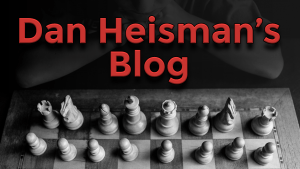Q&A with Coach Heisman Jan 24, 2014
"What can I do to get worse at chess? Right now I am playing too well."
Great question, and possibly not as silly as it may sound. After all, GM Znosko-Borovsky once wrote a book called How Not to Play Chess, so why not look at ways to get worse? The objective is that avoiding these will help, while having a little fun.
Before doing so, we might speculate that the questioner wanted to sandbag - lower his rating to qualify for a big money "Under-X" section - but I think not; any real sandbagger would not be asking  .
.
So, hopefully in the spirit in which it was asked, here are some ways to get worse at chess, or at least play badly:
- Play way too fast or way too slow. Nothing like getting into time trouble while still in a boring opening to help you lose to almost everyone. Or perhaps try to play your 45 45 game so quickly that you have more than 70 minutes left at the end; that should do it.
- Activate the king early and often. Castling is forbidden. Perhaps you can augment the supposed "Fischer-handicap" opening 1.f3 and 2.Kf2 with the daring 3.Ke3!?!? But in the endgame tuck your king away in the corner. All that open space is bad for his health.
- Don't bother to see if there's anything forceful your opponent can do next move (checks, captures, or threats). Just make a move without regard to the possible consequences and wait to see what he does. If he makes a threat you can't meet, well, that should help your rating tank.
- Don't develop all your pieces. Just bring out two or three and keep moving them over and over. Save your rooks for the endgame - just keep them tucked in the corner unless, of course, the center gets locked with pawns. Then you can centralize those rooks on those locked files.
- Take away all your pieces' mobility. Block bishops' diagonals with unmovable pawns and similarly block rooks' files. Knights placed on g2 and b2 are often awkward, so maneuver them there. Try to find places where your queen can be harassed by the entire enemy army and maybe, if you're lucky, even trapped!
- Try to memorize entire opening books before you dare play the opening. Even better, fear everyone and don't play at all; just stay home and see how many opening moves you can memorize.
- Don't ever look up your opening in opening books or databases after your game. Just keep making the same bad moves over and over. [I once had a student who had been playing for ~20 years and had many opening books, but his defense to 1.d4 was the Marshall Variation: 1.d4 d5 2.c4 Nf6. It's not the worst opening in the world, but it's not exactly good, either. When I asked if he had ever looked up his standard defense in one of his many books, he admitted "No" - which is understandable since it would be difficult to locate it anyway.] And especially don't look up any of your blitz games' openings - they are a different game and would never appear in opening books, so what could you learn that would help you in slow or important games?
- Stay up late before all important games and see how much fun you can have til the wee hours; no sleep is the goal. In-between rounds don't rest or review your game with your opponent, but see how many blitz games you can get in before the pairings go up; perhaps some quick junk food to hold you over.
- Play all your blitz games with a different increment than your important slow games; playing blitz games with no increment while your important games use increments (and time delays) is especially insidious. That way you learn that in a 5 0 game you would rather have 20 seconds left and be down a queen in a late middlegame than have 10 seconds and be ahead a queen. Then, when you play in a serious game with an increment or delay, you will not be accustomed to the fact that it's now the other way around: under those circumstances, you would much rather be ahead a queen with 10 seconds left, pretty much no matter how much time your opponent has.
- If you see a good move, look for a worse one. Or, better yet, play the first move you see without any thought at all - wait, we covered that under playing too fast. Try repeatedly to see if sacrificing a queen for a pawn is good enough (even giving up a knight and bishop for a rook and pawn is often enough to lose, but that's one's a little closer).
- See how many weak squares and pawns you can create in one game. If your opponent can take advantage of them, give yourself a triple word score.
- Push only one pawn out a single square to allow the development of one bishop and one pawn out for the other bishop; that's it; only two pawn moves (OK, no pawn moves is worse, but I'm trying to list things bad players actually do, like start games with 1.e4 and then later only d3 or 1.d4 and later only 2.e3) Moving more than two pawns is useless and a waste of time. Feel free to block all your break moves with your other pieces. And never push a pawn in front of your king; that way you can ensure your opponent will never resign since back-rank mates remain perennial possibilities.
- Offer your opponents draws in winning positions; that way you will never lose through later blunders since your grateful opponent will almost always accept.
- There's many, many more, so I will let you have fun coming up with some!

"I can't get around Alekhine's Nazi sympathies."
I doubt you will have to; you probably won't be meeting him any time soon. Many chess players have "off-the-field" problems, but that should not stop you from appreciating their chess or contributions to the chess world. You can admire the player but not the person. Of course, Bobby Fischer is a prime example: while he was generally personable one-on-one, Fischer's social and political views were, to put it politely, often extreme. Alekhine claimed (after World War II, of course) that he was trapped behind Nazi lines and only supported them because he had no choice. Of course, many historians claimed he played that part quite a bit too well, but we'll never really know exactly where his inner feelings lay.
"What's a good rating gain for your first year of play?" This question sounds reasonable, but there's so many parameters that giving a sensible answer is tough. For example, the lowest rating that the US Chess Federation gives out is 100, so if you play a tournament your first day of learning the moves, that is likely about your playing strength. But such factors as your age, the amount of time you have to study (or do study), and the availability of better players to work with you all have a strong influence on the answer. So an 11 year old rated 100 who is about to play a couple hundred tournament games and has a good school coach will undoubtedly gain a lot more in the next year than an adult beginner who gets a 1000 rating but has a full-time job and a family.
Penn State's Fight against Breast Cancer will again be supporting an online auction at www.charitybuzz.com Proceeds fund breast cancer research and educational programs at Mount Nittany Medical Center, Penn State Hershey Cancer Institute, PA Breast Cancer Coalition, the Kay Yow/WBCA Cancer Fund and J.C. Blair Memorial Hospital. Thanks to permission from Chess.com, we will be auctioning off a guest appearance on "Q&A with Coach Heisman" in the near future (via CharityBuzz.com) for this cause. The winner will be invited to Dan's home in Wynnewood, PA, to be a guest on a future show. More details will be provided as they are known.
This show was open to all, as may all the shows in the near future. The next one will be 5-6:30 PM ET on Feb 7.






